Major Updates
Bipartisan Bills on Workforce Pell and WIOA Retooling Introduced in US House of Representatives
A bipartisan group of the U.S. House of Representatives has released the Bipartisan Workforce Pell Act, a bill to expand eligibility of Pell Grants for shorter-term programs; and separately, A Stronger Workforce for America Act, a bill making significant updates to the Workforce Innovation and Opportunity Act (WIOA).
The Bipartisan Workforce Pell Act is the latest proposal from congressional leadership expanding Pell Grants for short-term education and training programs of at least 150 clock hours of instruction (or an equivalent number of credit hours), but less than 600 clock hours of instruction, offered during a minimum of eight weeks, but less than 15 weeks. While there have been a number of proposals in Congress over the last few years, the Bipartisan Workforce Pell Act sheds some of the most stark sticking points that past bills have faced, which included not allowing fully online programs or for-profit institutions to take part in the eligibility. Yet, the law has a funding plan meant to fund the expansion by reducing federal student loans to many colleges and universities affected by a tax on investment income, known as the ‘endowment tax’. Also, the current bill sets up some high bars for program eligibility, including requiring a program completion and job placement rate of 70% for each program, controlled calculations on tuition charged, and a wage floor for those who complete the program to have median earnings equal to or greater than high school graduates in their state. Oversight also includes a collective of the US Department of Education, state workforce boards, and accrediting agencies, and the programs must be provided exclusively by accredited and federally eligible institutions.
The A Stronger Workforce for America Act provides the pathway to strengthen and build connections between employers and the workforce and training system, by updating WIOA and helping provide Americans with career access and advancement. While offering certain improvements, critics have expressed concerns that the bill might not sufficiently enhance the existing WIOA structure, which has been considered less than robust. Notable items the bill amends includes:
- Dedicating 50 percent of the adult and dislocated worker funding towards upskilling workers through “individual training accounts” (ITAs), on-the-job learning, and other employer-led skills development
- Simplifying the eligible training provider list (ETPL) to match skills and job demands, while enforcing performance standards to hold workforce boards accountable for positive participant outcomes
- Fortifying a program to help individuals released from incarceration transitioning to employment
- Offering clear information about awarded credentials, including details like who awards them, industry recognition, the skills they represent, and participants’ employment and earnings outcomes
- Increased support for community college workforce education programs
Both bills have passed the House Education and Workforce Committee, however, the expected outcomes for both bills are unclear in the full House of Representatives, as well as the Senate.
Bipartisan Workforce Pell Act
-
- Read the House Education and Workforce Committee’s Press Release on the Bipartisan Workforce Pell Act.
- Click here for bill text.
- Click here for a bill summary.
A Stronger Workforce for America Act
-
- Read the House Education and Workforce Committee’s Press Release on the A Stronger Workforce for America Act.
- Click here for bill text.
- Click here for a bill summary.
Today’s Students Coalition releases Equity Now Toolkit: Advancing racial equity in higher education through federal policy for today’s students
Today’s students of color face systemic inequities that are woven on campuses, in state halls, and in federal policies, and that are unfairly holding them back from achieving their goals. Despite the dedication and talent today’s students bring to classrooms across the nation, many are not succeeding due to outdated and inequitable federal policies, allowing race to predict success and postsecondary outcomes.
The Today’s Students Coalition’s (TSC) Equity Now Toolkit is a resource designed to guide and support our country’s advocates and leaders in addressing racial disparities in higher education. The reforms in this toolkit offer a wide array of changes that can help bridge racial equity gaps in postsecondary student access, success, and completion. In the toolkit, you will find:
- Background information on racial equity and disparities in higher education outcomes;
- An overview of policy reforms that leaders can use to close racial equity gaps; and
- A list of resources readers can review to learn more about a particular issue.
Advancing racial equity in higher education should not be a partisan issue and must be championed by everyone. The TSC is deeply committed to working with policymakers on both sides of the aisle to enact change for the benefit of today’s students.
UPCEA is a proud contributor to this toolkit and a founding steering committee member of the Today’s Students Coalition.
Other News
- Invite Your Students to the DC Student Summit
Being held this coming March 3-5, the three-day DC Student Summit in our nation’s capital will equip students with the skills necessary to elevate their stories and lived experiences directly to federal policymakers. Led by the Today’s Students Coalition (of which UPCEA is a founding steering committee member) and LeadMN, students will have the opportunity to learn how to effectively share their stories with policymakers, learn about current hot topics in DC surrounding higher education, racial equity, and efforts to address students’ basic needs, as well as a day on the Hill meeting with Congressional offices. Space is limited, so make sure you share with interested students and encourage them to register soon! Learn more.
- ‘The Gloves Have Come Off’: Lawmakers Ramp Up Scrutiny of Higher Ed (Inside Higher Ed)
It’s a head-spinning race to create the best in Generative AI (GenAI) with the Google Gemini release and OpenAI GPT 5 expected to come out soon.
Over the past year and a half, the advances in GenAI have been astounding. The impact on the way we conduct research, teach classes and develop new learning materials is nothing less than revolutionary. Yes, there are limitations and yes, there are misfires along the way. The current versions of GenAI are not yet at a standard that the general public has come to expect from high tech today. However, hallucinations are on the decline as OpenAI, Anthropic, Google and the other providers tweak their Large Learning Models (LLMs). It is a process of training the models to be more precise while not impinging on the creativity of responses. As Rahul Pradhan writes in Datanami, “AI models are only as effective and intelligent as the dataset they’ve been trained on. Often, AI hallucinations can occur and are a result of a variety of factors, including overfitting, data quality and data sparsity.” Progress is seen in each succeeding generation of the LLMs.
Yet, we must not simply sit by twiddling our thumbs while the rest of the world is adopting the technology and adapting to the current shortcomings so that we can implement the awesome capabilities as soon as possible. There is so much that we can experiment with, and accomplish, with the current models that are already available. Pradhan suggests “Prompt engineering gives AI models additional context which can lead to fewer instances of hallucinations. This technique helps LLMs produce more accurate results because it feeds models highly descriptive prompts.”
We all can improve our prompts through practice and following suggestions from the GenAI apps themselves. For example, I asked Google Bard how I could improve my prompts and it responded with multiple suggestions as well as a reading list that included the following from Google Cloud: “Best practices for prompt engineering”
Go ahead and ask your favorite GenAI app how to improve your prompts, for example: Google Bard, ChatGPT, Claude 2, or another of the many apps, submit some prompts, then and ask “how can I improve my prompts?” While you are at it, cut and paste your prompt into two more chatbots. Compare the results and compile the best solutions among the three.
To further improve and tailor responses to the inquirer, we are seeing developments in Retrieval-Augmented Generation (RAG). This technique is beginning to enable the GenAI to take into account more current and detailed information to give enhanced context to meet the needs of the inquirer. Oracle Cloud Infrastructure Technology Content Strategist Alan Zeichick describes the process:
Today, in the early phases of RAG, the technology is being used to provide timely, accurate, and contextual responses to queries. These use cases are appropriate to chatbots, email, text messaging, and other conversational applications. In the future, possible directions for RAG technology would be to help generative AI take an appropriate action based on contextual information and user prompts…. RAG might also be able to assist with more sophisticated lines of questioning. Today, generative AI might be able to tell an employee about the company’s tuition reimbursement policy; RAG could add more contextual data to tell the employee which nearby schools have courses that fit into that policy and perhaps recommend programs that are suited to the employee’s jobs and previous training—maybe even help apply for those programs and initiate a reimbursement request.
It is important to every discipline, every student, every faculty member, every staff member and administrators that we become familiar with, and adept at using GenAI. For students, this is the rising tide that touches virtually all careers. It is especially important in fields such as management, accountancy, psychology and a host of other fields that, in some cases, can anticipate a wholesale reconfiguration of position descriptions and declining demand for new hires.
HR departments are placing a high priority on hiring those applicants with documented portfolios demonstrating prompt engineering skills. Writing in the New York Times, Chip Cutter reported on the rapid rise in salaries offered to qualified applicants with extensive AI experience: “Salaries for AI roles vary based on the experience required and the company hiring. Total compensation, which typically includes bonuses and stock-based grants, can push overall pay much higher. A product manager position for a machine-learning platform at Netflix lists a total compensation of up to $900,000 annually.”
For faculty and staff members, and especially administrators, facility with chatbots will result in far greater efficiencies and even the ability to rapidly create detailed reports which, in the past, would have taken too long to develop and customize for the institution. Our abilities and competitiveness as individuals and institutions will increasingly be tied to the enhanced productivity enabled by Generative AI.
During the holiday break, perhaps you can find time to develop your GenAI skills. If possible, run at least one prompt every day. Make sure when you run the prompt on one chatbot, you also run it on two other apps to compare the results. This will also help you spot hallucinations if they pop up. Over time, your skills will grow to become faster and more expert at using these emerging tools. It will become as customary as posting a Google Search question today.
We need to begin to consider GenAI to be our personal assistant. Imagine that it is an actual assistant, albeit a little quirky, who stands by ready to help 24×7. This assistant has passed the interstate bar exam, posted near perfect scores on the SAT and GRE, and on most bots, its knowledge is up-to-date within a couple of weeks. It is blazingly fast, thoroughly researching and posting an answer far faster than you could have even just typed the response. In most cases, you will find that you will need to further refine your original prompt with a few follow-up inquiries. The follow-up is part of the process of getting the response you are seeking.
Invest the time now to learn how to pose effective prompts and assess answers by comparing to other chatbots and sources. Continue to practice daily. This will pay off in your efficiency and effectiveness as the quality of GenAI applications improve. This will put you in a position to best serve your university, your students and your own interests as you grow with the technology.
This article was originally published in Inside Higher Ed’s Transforming Teaching & Learning blog.
by Tracy Chapman, PhD, Chief Academic Officer at Collegis Education
Much of the adult learner population is focused on career advancement, on earning the next credential to support their career goals. However, ask anyone in higher education to picture an adult learner, and they are likely to describe an academic-focused learner pursuing a master’s or doctoral degree to advance in their field of study. At Collegis Education, we surveyed 1,000 adult learners interested in pursuing degrees and discovered distinct student personas and motivations.
A career-focused majority
Many schools are betting all their marketing time and dollars on these “traditional” adult students, and that is a misplaced effort. Our recent study found that 70% of the adult learner market is made up of highly career-focused individuals. Their approach to higher education is less academic and more transactional, and they seek programs tightly aligned with career goals.
These career-focused adult learners represent a welcome opportunity for higher education as recent shifts in attitude about the value of an undergraduate degree look to be permanent. In The Impact of the New Adult Learner, UPCEA notes “Higher education can reinvent itself and grow, becoming the major player in workforce reskilling, as well as attracting a large segment of the 40 million+ adults in the U.S. who have college credit but lack a degree.”
Rethink your approach
Becoming an institution of choice for career-minded adults requires rethinking marketing, recruiting, and enrollment efforts, as well as programs and program delivery. Adult learners expect contemporary, relevant, and consumer-focused services and programs. They shop around to find programs that fit their professional needs and instructional models that support a work/life balance.
In other words, if you do not build it, they will not come.
Four types of adult learners
Reskilling, upskilling and lifelong learning are creating a big opportunity for higher education to become the go-to resource for career-minded adults. But not all adult learners are alike. Four types of adult learners emerged from our survey responses:
- Career Advancers
- Career Builders
- Discerning Academics
- Hesitant Learners
Get our white paper “Rethink Your Student Population” to discover their motivations, how to target your outreach and optimize programs to grow enrollment in this untapped population.
Download “Rethink Your Student Population” here
About Collegis Education
Collegis Education is higher ed’s innovation enabler, empowering schools with a better vision of how they fit into learners’ lives and what’s possible when they do. With more than 10 years’ experience as industry pioneers, we’ve proven how leveraging data and technology can transform everything from student experiences to business processes. As higher ed evolves, you’ll need a thought partner and tactical pro, not a pre-packaged product or platform. Our strategic services allow institutions to leapfrog from wondering to doing, implement long-term growth plans and build in-house capacity to thrive in a complex market. Learn more at CollegisEducation.com.
About the Author
Dr. Tracy Chapman is Collegis Education’s Chief Academic Officer. Prior to joining Collegis, she was dean of the School for Professional Studies and associate provost for Distance Education at Saint Louis University (SLU). Chapman also directed the Center for Academic Innovation at Creighton, served as the assistant dean for the College of Professional Studies, and led an IT unit supporting technology-enhanced programs in pharmacy, occupational therapy and physical therapy. She received her Ph.D. from the University of Nebraska in internet-based education, her master’s degree in instructional technology from West Texas A&M University, a teaching certificate from Southwest Texas State University, and a bachelor’s in finance from the University of South Carolina.
WASHINGTON, December 7, 2023 – UPCEA, the online and professional education association, is pleased to announce the election of new officers and new directors to serve on the UPCEA Board of Directors. Elected in November, these individuals will assume their roles at the conclusion of the 2024 UPCEA Annual Conference in Boston, Massachusetts on March 28, 2024.
“I’m pleased to welcome these exceptional individuals to their leadership roles on behalf of the Governance and Nominations Committee and the association,” said Kim Siegenthaler, Ph.D., Associate Vice Chancellor for Academic Strategy and Operations at City University of New York (CUNY); 2023-2024 UPCEA Board President-Elect, and Chair, UPCEA Governance and Nominations Committee. “I know that these experienced leaders will make a significant positive impact on UPCEA and our field during their terms.”
“These incoming officers and directors are joining UPCEA’s Board during a period of notable success for the association and significant change in our field,” said Bob Hansen, UPCEA CEO. “Their agility, strategic insight, and dedication to broadening access to higher education through innovative approaches position UPCEA strongly for the challenges and opportunities that lie ahead.”
UPCEA welcomes two officers, three committee chairs, one corporate partner representative, and six Directors At-Large to the 2024-2025 Board of Directors:
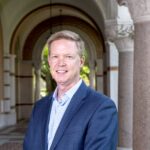 Robert Bruce, Ph.D., Dean, Susanne M. Glasscock School of Continuing Studies at Rice University, will serve as Board President-Elect for a one-year term (2024-2025) and then ascend to the role of Board President (2025-2026). Dr. Bruce joined Rice University on Nov. 1, 2017, as Dean of the Susanne M. Glasscock School of Continuing Studies and Adjunct Professor of Humanities. As Dean, he leads the school in offering graduate degrees and certificates, personal and professional development programs, online and hybrid courses, and innovative credential approaches. Dr. Bruce previously held leadership positions at UNC Chapel Hill and UT Austin. He earned a Bachelor’s in English from UT Austin, and a Master’s and a Doctorate in English from Texas A&M.
Robert Bruce, Ph.D., Dean, Susanne M. Glasscock School of Continuing Studies at Rice University, will serve as Board President-Elect for a one-year term (2024-2025) and then ascend to the role of Board President (2025-2026). Dr. Bruce joined Rice University on Nov. 1, 2017, as Dean of the Susanne M. Glasscock School of Continuing Studies and Adjunct Professor of Humanities. As Dean, he leads the school in offering graduate degrees and certificates, personal and professional development programs, online and hybrid courses, and innovative credential approaches. Dr. Bruce previously held leadership positions at UNC Chapel Hill and UT Austin. He earned a Bachelor’s in English from UT Austin, and a Master’s and a Doctorate in English from Texas A&M.
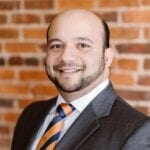 Asim Ali, Ph.D., Executive Director, Biggio Center for the Enhancement of Teaching & Learning at Auburn University, will serve as Secretary-Treasurer for a two-year term (2024-2026). As the Executive Director of the Biggio Center, Dr. Ali advances the center’s mission of providing professional development programs, services, and resources to enhance instructional innovation and support scholarly and creative activities. He oversees the center’s various units, which include Auburn Online, Biggio Teaching, Biggio Technology, Biggio Testing, and Engaged and Active Student Learning classrooms and classroom buildings. Dr. Ali co-leads Auburn’s augmented and virtual reality initiative, AUX, in collaboration with the Office of Information Technology. He also co-leads work on artificial intelligence for the Office of the Provost to build faculty capacity for understanding and implementing AI in teaching and learning, including serving as chair of the AI@AU Education Committee.
Asim Ali, Ph.D., Executive Director, Biggio Center for the Enhancement of Teaching & Learning at Auburn University, will serve as Secretary-Treasurer for a two-year term (2024-2026). As the Executive Director of the Biggio Center, Dr. Ali advances the center’s mission of providing professional development programs, services, and resources to enhance instructional innovation and support scholarly and creative activities. He oversees the center’s various units, which include Auburn Online, Biggio Teaching, Biggio Technology, Biggio Testing, and Engaged and Active Student Learning classrooms and classroom buildings. Dr. Ali co-leads Auburn’s augmented and virtual reality initiative, AUX, in collaboration with the Office of Information Technology. He also co-leads work on artificial intelligence for the Office of the Provost to build faculty capacity for understanding and implementing AI in teaching and learning, including serving as chair of the AI@AU Education Committee.
 Laurel Hogue, Ed.D., Vice Provost For Online And Learning Engagement at University of Central Missouri, will serve as Network Senate Chair for a two-year term (2024-2026). Dr. Hogue has worked for UCM since 2003, serving as vice provost for Extended Studies for six years before being named vice provost for online and learning engagement in 2021. In her role, she supports the university’s vision for enrollment and retention, leads marketing and promotion efforts, and directs fiscal operations for entrepreneurial and off campus programs. Her duties also include budget planning and resource allocation, conducting cost analyses to ensure revenue-generating operations for distance learning, dual credit, workforce development, and UCM – Lee’s Summit operations at the Missouri Innovation Campus. Additionally, she is responsible for the Honors College, Digital Learning and Instructional Innovation, the Center for Global Education, and service learning and community engagement. She holds a Bachelor of Science in Business Administration and a Master of Business Administration from UCM, and a Doctorate of Education in educational leadership and policy analysis from the University of Missouri-Columbia.
Laurel Hogue, Ed.D., Vice Provost For Online And Learning Engagement at University of Central Missouri, will serve as Network Senate Chair for a two-year term (2024-2026). Dr. Hogue has worked for UCM since 2003, serving as vice provost for Extended Studies for six years before being named vice provost for online and learning engagement in 2021. In her role, she supports the university’s vision for enrollment and retention, leads marketing and promotion efforts, and directs fiscal operations for entrepreneurial and off campus programs. Her duties also include budget planning and resource allocation, conducting cost analyses to ensure revenue-generating operations for distance learning, dual credit, workforce development, and UCM – Lee’s Summit operations at the Missouri Innovation Campus. Additionally, she is responsible for the Honors College, Digital Learning and Instructional Innovation, the Center for Global Education, and service learning and community engagement. She holds a Bachelor of Science in Business Administration and a Master of Business Administration from UCM, and a Doctorate of Education in educational leadership and policy analysis from the University of Missouri-Columbia.

Pamela Wimbush, Ed.D., Interim Dean at California State University, Sacramento, will serve as a Diversity and Inclusive Excellence Committee Co-Chair for a two-year term (2024-2026). Dr. Wimbush, a seasoned education professional with two decades of experience, has made a significant impact on institutions as a distinguished scholar, researcher, and educator in continuing, professional, and online education. She is dedicated to expanding access and social mobility through quality learning. Currently serving as the interim Dean for the College of Continuing Education, Dr. Wimbush champions programs to widen educational access. Her academic journey includes degrees in computer studies, distance education, and management, culminating in a Doctorate from the University of Wyoming. Dr. Wimbush’s commitment extends to advisory roles, national tech initiatives, and transforming lives through education.
Dr. Wimbush joins Militza “Mili” Maldonado Agusty, M.A., PHR, Executive Director, School of Professional Studies at Universidad del Sagrado Corazón, who is in the second year of her two year term (2023-2025) as Diversity and Inclusive Excellence Committee Co-Chair.
 Tatum Thomas, Ph.D., Dean, School of Continuing and Professional Studies at DePaul University, will serve as a Membership Committee Chair for a two-year term (2024-2026). Dr. Thomas provides strategic leadership for DePaul University’s School of Continuing and Professional Studies (SCPS). SCPS offers undergraduate adult, graduate, and nondegree programs. In addition, its centers, and special initiatives, such as the Center for the Advancement of Adults in Education, Labor Education Center, and the Adult Men of Color Initiative emphasize access and activism. She currently serves on DePaul University’s Planning Committee for the Institute for Restorative Educational Engagement, supporting advancements in college-in-prison programs, and as a Peer Evaluator with the Middle States Commission on Higher Education. Dr. Thomas previously held administrative roles at Columbia University, New York University, and Marymount Manhattan College. Dr. Thomas holds a Doctorate in Organizational Leadership from the Chicago School of Professional Psychology, a Master’s in Higher Education Administration from Baruch College, City University of New York, a Bachelor’s in Psychology from Marymount Manhattan College, and a Certificate in Management Excellence from the Harvard Business School. Dr. Thomas is a member of Edward A. Bouchet Society.
Tatum Thomas, Ph.D., Dean, School of Continuing and Professional Studies at DePaul University, will serve as a Membership Committee Chair for a two-year term (2024-2026). Dr. Thomas provides strategic leadership for DePaul University’s School of Continuing and Professional Studies (SCPS). SCPS offers undergraduate adult, graduate, and nondegree programs. In addition, its centers, and special initiatives, such as the Center for the Advancement of Adults in Education, Labor Education Center, and the Adult Men of Color Initiative emphasize access and activism. She currently serves on DePaul University’s Planning Committee for the Institute for Restorative Educational Engagement, supporting advancements in college-in-prison programs, and as a Peer Evaluator with the Middle States Commission on Higher Education. Dr. Thomas previously held administrative roles at Columbia University, New York University, and Marymount Manhattan College. Dr. Thomas holds a Doctorate in Organizational Leadership from the Chicago School of Professional Psychology, a Master’s in Higher Education Administration from Baruch College, City University of New York, a Bachelor’s in Psychology from Marymount Manhattan College, and a Certificate in Management Excellence from the Harvard Business School. Dr. Thomas is a member of Edward A. Bouchet Society.
 Eric McGee, MBA, Senior Director of Marketing & Corporate Communication at EducationDynamics, will serve as Corporate Partner Representative for a one-year term (2024-2025). McGee is an experienced higher education marketing professional who excels at providing creative solutions. He is currently responsible for the management of the EducationDynamics brand-building initiatives and content creation, including EducationDynamics’ industry-leading Higher Ed Landscape and Marketing and Enrollment Management Benchmarks Report. He previously served as the Director of Continuing and Professional Education at the University of South Carolina.
Eric McGee, MBA, Senior Director of Marketing & Corporate Communication at EducationDynamics, will serve as Corporate Partner Representative for a one-year term (2024-2025). McGee is an experienced higher education marketing professional who excels at providing creative solutions. He is currently responsible for the management of the EducationDynamics brand-building initiatives and content creation, including EducationDynamics’ industry-leading Higher Ed Landscape and Marketing and Enrollment Management Benchmarks Report. He previously served as the Director of Continuing and Professional Education at the University of South Carolina.
The following individuals will serve as at-large directors for two-year terms (2024-2026):
 Bettyjo Bouchey, Ed.D., is Associate Professor and Vice Provost of Digital Strategy and Operations at National Louis University where she is responsible for standards of quality and service for online programming across the institution, alternative graduation pathways, learning experience design, and academic innovation, overall. Dr. Bouchey holds a Bachelor’s in Psychology from the University at Albany, a Master of Business Administration in Entrepreneurship from Rensselaer Polytechnic Institute, and a Doctorate in Education from Northeastern University. Her research interests include the nature and future of organizational structures of online units in institutions of higher education, as well as inventive and high-impact pedagogical practice in online teaching, inclusive of artificial intelligence and machine learning.
Bettyjo Bouchey, Ed.D., is Associate Professor and Vice Provost of Digital Strategy and Operations at National Louis University where she is responsible for standards of quality and service for online programming across the institution, alternative graduation pathways, learning experience design, and academic innovation, overall. Dr. Bouchey holds a Bachelor’s in Psychology from the University at Albany, a Master of Business Administration in Entrepreneurship from Rensselaer Polytechnic Institute, and a Doctorate in Education from Northeastern University. Her research interests include the nature and future of organizational structures of online units in institutions of higher education, as well as inventive and high-impact pedagogical practice in online teaching, inclusive of artificial intelligence and machine learning.
 Rene Eborn, M.Ed., is Deputy of Digital Transformation and Associate Vice President of Strategic Initiatives at Utah State University. Eborn has over three decades of higher education and technology experience and is passionate about education. She is experienced in building sustainable, innovative process and culture by aligning university business goals and technology investments to lead cultural change and transformation within higher education. She has worked at innovative universities to help promote change such as WGU, SNHU, and currently has come full circle returning to her roots as the Deputy of Digital Transformation and the Associate Vice President, overseeing university transformation and strategic initiatives, at Utah’s prestige land-grant institution Utah State University where she began her career. Rene has her advanced degree in Education with an emphasis in Adult Learning and Technology in Post-Secondary Education, a certification from Harvard Program on Negotiation and Leadership, and certification from MIT in Digital Transformation.
Rene Eborn, M.Ed., is Deputy of Digital Transformation and Associate Vice President of Strategic Initiatives at Utah State University. Eborn has over three decades of higher education and technology experience and is passionate about education. She is experienced in building sustainable, innovative process and culture by aligning university business goals and technology investments to lead cultural change and transformation within higher education. She has worked at innovative universities to help promote change such as WGU, SNHU, and currently has come full circle returning to her roots as the Deputy of Digital Transformation and the Associate Vice President, overseeing university transformation and strategic initiatives, at Utah’s prestige land-grant institution Utah State University where she began her career. Rene has her advanced degree in Education with an emphasis in Adult Learning and Technology in Post-Secondary Education, a certification from Harvard Program on Negotiation and Leadership, and certification from MIT in Digital Transformation.
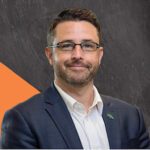 Adam Fein, Ph.D., has served as Vice President for Digital Strategy and Innovation and Chief Digital Officer at University of North Texas since November 2018. As the head of UNT’s online and digital strategies, he leads the charge to identify new directions and opportunities to improve the academic quality, reach and performance of the university in the online and global education markets. His research is focused on the examination of the cognitive theory of multimedia learning and the effects of disruptive innovation theory in higher education. Prior to joining UNT, Dr. Fein served the University of Illinois at Urbana-Champaign for 17 years in numerous roles with online and innovative education. He was responsible for shaping campus strategy and providing campus-wide support for innovations in classroom and online settings. In his previous roles, he was responsible for overseeing the instructional design, instructional development, instructional media resources, and online academic and student affairs teams. Prior to his time in higher education at two of the world’s largest universities, he served as a training and development consultant at Pepsi/Gatorade Inc. and at the Quaker Oats Company. In addition, Dr. Fein has published book chapters and numerous professional papers.
Adam Fein, Ph.D., has served as Vice President for Digital Strategy and Innovation and Chief Digital Officer at University of North Texas since November 2018. As the head of UNT’s online and digital strategies, he leads the charge to identify new directions and opportunities to improve the academic quality, reach and performance of the university in the online and global education markets. His research is focused on the examination of the cognitive theory of multimedia learning and the effects of disruptive innovation theory in higher education. Prior to joining UNT, Dr. Fein served the University of Illinois at Urbana-Champaign for 17 years in numerous roles with online and innovative education. He was responsible for shaping campus strategy and providing campus-wide support for innovations in classroom and online settings. In his previous roles, he was responsible for overseeing the instructional design, instructional development, instructional media resources, and online academic and student affairs teams. Prior to his time in higher education at two of the world’s largest universities, he served as a training and development consultant at Pepsi/Gatorade Inc. and at the Quaker Oats Company. In addition, Dr. Fein has published book chapters and numerous professional papers.
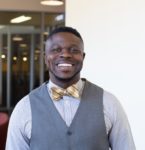 Jasmeial “Jazz” Jackson, Ed.D., is the Vice Provost and Chief Student Success, Equity, and Inclusion Officer at Thomas Edison State University (TESU). Within UPCEA, he has served as the UPCEA Diversity and Inclusive Excellence Committee Co-Chair, New England Region Chair, and New England Region Communication Chair. At TESU, Dr. Jackson oversees advising, faculty, career services, military and veteran support, student accessibility services, tutoring services, mental health services, academic integrity, and equity and inclusion. He collaborates with every institutional division, ensuring a holistic, intentional student experience that equips learners with the knowledge, skills, and support they need from enrollment and beyond to achieve their academic and personal goals successfully. Dr. Jackson works on strategic teams across the university to coordinate university-wide retention initiatives. He has worked for private, for-profit, and public educational institutions. He has a Doctorate of Education in Higher Education Administration, a Master of Business Administration, and a Bachelor of Science in Construction Engineering. He lives by a quote by Mahatma Gandhi, “Live as if you were to die tomorrow. Learn as if you were to live forever.”
Jasmeial “Jazz” Jackson, Ed.D., is the Vice Provost and Chief Student Success, Equity, and Inclusion Officer at Thomas Edison State University (TESU). Within UPCEA, he has served as the UPCEA Diversity and Inclusive Excellence Committee Co-Chair, New England Region Chair, and New England Region Communication Chair. At TESU, Dr. Jackson oversees advising, faculty, career services, military and veteran support, student accessibility services, tutoring services, mental health services, academic integrity, and equity and inclusion. He collaborates with every institutional division, ensuring a holistic, intentional student experience that equips learners with the knowledge, skills, and support they need from enrollment and beyond to achieve their academic and personal goals successfully. Dr. Jackson works on strategic teams across the university to coordinate university-wide retention initiatives. He has worked for private, for-profit, and public educational institutions. He has a Doctorate of Education in Higher Education Administration, a Master of Business Administration, and a Bachelor of Science in Construction Engineering. He lives by a quote by Mahatma Gandhi, “Live as if you were to die tomorrow. Learn as if you were to live forever.”
 Cheryl Murphy, Ed.D., is Vice Provost for Distance Education at the University of Arkansas. Dr. Murphy is a full professor in Educational Technology and has held her current administrative position overseeing Global Campus since 2019. She acted as Department Head from 2017-2019, Program Coordinator from 2000-2017, and from 2011-2015 she served as Director of Distance Learning. She also served as co-director of the campus-wide Teaching and Faculty Support Center. Externally Dr. Murphy has worked with the Higher Learning Commission since 2007 as a Peer Reviewer, Team Chair, and is currently on the HLC Institutional Actions Council.
Cheryl Murphy, Ed.D., is Vice Provost for Distance Education at the University of Arkansas. Dr. Murphy is a full professor in Educational Technology and has held her current administrative position overseeing Global Campus since 2019. She acted as Department Head from 2017-2019, Program Coordinator from 2000-2017, and from 2011-2015 she served as Director of Distance Learning. She also served as co-director of the campus-wide Teaching and Faculty Support Center. Externally Dr. Murphy has worked with the Higher Learning Commission since 2007 as a Peer Reviewer, Team Chair, and is currently on the HLC Institutional Actions Council.
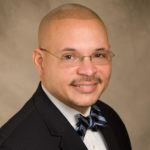 Craig Wilson, J.D., Ph.D., is Vice Provost for Online, Distance and Continuing Education, and Professor of Practice at the University of Arizona. He strives to broaden access to quality education programs to learners around the world. Dr. Wilson led education enterprises that spanned multiple campuses and online. His background in online education started in the 1990s, and he has been actively involved in each growth phase. He has served in multiple capacities including as an instructional designer, faculty, and executive administrator in K12/university settings. His current research covers the metaverse in relation to higher education resulting in his Metaversity Framework.
Craig Wilson, J.D., Ph.D., is Vice Provost for Online, Distance and Continuing Education, and Professor of Practice at the University of Arizona. He strives to broaden access to quality education programs to learners around the world. Dr. Wilson led education enterprises that spanned multiple campuses and online. His background in online education started in the 1990s, and he has been actively involved in each growth phase. He has served in multiple capacities including as an instructional designer, faculty, and executive administrator in K12/university settings. His current research covers the metaverse in relation to higher education resulting in his Metaversity Framework.
Additionally, UPCEA is pleased to announce the selection of two new members of the Diversity & Inclusive Excellence Committee, two new members of the Finance Committee, two new members of the Membership Committee, and five new members of the Policy Committee. In their roles on these Board-level committees, these individuals are undertaking critically important work for the association and the field.
 Tiffany G. Townsend, Ph.D., Vice President of Organizational Culture and Chief Diversity Officer at Purdue University Global, joins the Diversity and Inclusive Excellence Committee as a member for a one-year term (2024-2025). Prior to joining Purdue Global, Dr. Townsend served as the Chief Diversity Officer for Augusta University. She also held faculty appointments at Penn State University and Georgetown University Medical Center, and served as Senior Director of the Office of Ethnic Minority Affairs (OEMA) for the American Psychological Association (APA). As a clinician and scholar, Dr. Townsend has worked for several decades to advance health equity. She earned her Bachelor of Arts in Psychology from Spelman College, and her Master’s and Doctorate in Clinical Psychology from George Washington University.
Tiffany G. Townsend, Ph.D., Vice President of Organizational Culture and Chief Diversity Officer at Purdue University Global, joins the Diversity and Inclusive Excellence Committee as a member for a one-year term (2024-2025). Prior to joining Purdue Global, Dr. Townsend served as the Chief Diversity Officer for Augusta University. She also held faculty appointments at Penn State University and Georgetown University Medical Center, and served as Senior Director of the Office of Ethnic Minority Affairs (OEMA) for the American Psychological Association (APA). As a clinician and scholar, Dr. Townsend has worked for several decades to advance health equity. She earned her Bachelor of Arts in Psychology from Spelman College, and her Master’s and Doctorate in Clinical Psychology from George Washington University.

Carol A. Hoshiko, Ph.D., Dean of Community and Continuing Education at Kapiolani Community College joins the Diversity and Inclusive Excellence Committee as a member for a one-year term (2024-2025). Dr. Hoshiko provides administrative leadership for Kapi`olani CC’s community education and workforce development programs. She serves on the Chancellor’s Executive Leadership Team as well as the Culinary Institute of the Pacific steering committee. In addition, Dr. Hoshiko is responsible for Community Relations and works extensively with external constituencies through her outreach efforts. Community Relations sponsors the Culinary Institute of the Pacific Quarterly Town Hall Meetings as well as the popular Kaiāulu Webinar Series, which features current topics and presenters from the community and campus. During her 30-year tenure at Kapi`olani CC, Dr. Hoshiko has served in different capacities including Interim Dean for Business, Culinary, Hotel, Travel, and Tourism; Acting Executive Director for the Honda International Center; Executive Assistant to the Chancellor and provided leadership for Alumni, Development, Marketing, Communications, and UH Fund Development.
Dr. Townsend and Dr. Hoshiko will serve alongside McCeil Johnson, J.D., Vice President Accreditation and Regulatory Compliance at University of Phoenix and Fatimah Wirth, Ph.D., Instructional Designer at Georgia Institute of Technology who were asked to renew their one year (2023-2024) terms on the Diversity and Inclusive Excellence Committee. Their second and final terms on the committee will conclude in 2025.
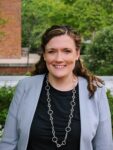 Ashley Law, B.S., Business Program Manager at the Johns Hopkins University School of Medicine in the Office of Online Education, joins the Finance Committee as a member for a one-year term (2024-2025). Law has expertly led the creation, implementation, and documentation of their program development processes. She oversees accounts, managing agreements, and communicating with stakeholders. A former Instructional Technologist, Law brings a holistic perspective to process optimization and project coordination. In her free time, she enjoys gaming, arts and crafts, and cooking. Born and raised in rural Iowa, she lives in Austin, Texas, with her husband and their pets.
Ashley Law, B.S., Business Program Manager at the Johns Hopkins University School of Medicine in the Office of Online Education, joins the Finance Committee as a member for a one-year term (2024-2025). Law has expertly led the creation, implementation, and documentation of their program development processes. She oversees accounts, managing agreements, and communicating with stakeholders. A former Instructional Technologist, Law brings a holistic perspective to process optimization and project coordination. In her free time, she enjoys gaming, arts and crafts, and cooking. Born and raised in rural Iowa, she lives in Austin, Texas, with her husband and their pets.

Christa Payne, MBA, Chief Business Officer, School of Professional Advancement at Tulane University joins the Finance Committee as a member for a one-year term (2024-2025). In her role, she is responsible for finances, operations, marketing, technology, and facilities. Payne helped develop and guide the financing and marketing for eight new online programs, as well as launching a new school name and brand campaign. Prior to Tulane, Payne worked as a senior managing consultant with Public Financial Management and the National Resource Network and she served as Vice President for External Affairs for the Public Education Foundation in Chattanooga, TN. Payne earned her Bachelor’s from Sewanee: The University of the South and her Master of Business Administration from Tulane University. She lives in New Orleans with her husband and three daughters.
Law and Payne will serve alongside Patrick Wilson, Ed.D., Executive Director, Online & Extended Learning at New Mexico Highlands University and Jen Schwedler, Ed.D., Associate Dean Academic Affairs and Online Learning at University of California, Davis, who were asked to renew their one year (2023-2024) terms on the Finance Committee. Their second and final terms on the committee will conclude in 2025.
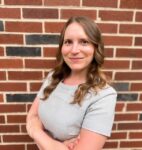 Christine Cicio, MPA, Director, Continuing Education and Innovation at the Pennsylvania State University, Abington College, joins the Membership Committee as a member for a one-year term (2024-2025). She oversees professional development training, custom training for organizations, youth/community programs, and the LaunchBox, a program supporting small businesses and entrepreneurs. Cicio is responsible for building community and business partnerships, identifying strategic opportunities, and implementing new initiatives and alternative revenue streams. She strives to provide high-quality and accessible educational opportunities for all students. Serving on the NJ Arthritis Foundation Leadership Board, Cicio is an advocate for people with disabilities. She holds a Bachelor’s in Sociology and a Master of Public Administration which were both obtained at Rutgers University.
Christine Cicio, MPA, Director, Continuing Education and Innovation at the Pennsylvania State University, Abington College, joins the Membership Committee as a member for a one-year term (2024-2025). She oversees professional development training, custom training for organizations, youth/community programs, and the LaunchBox, a program supporting small businesses and entrepreneurs. Cicio is responsible for building community and business partnerships, identifying strategic opportunities, and implementing new initiatives and alternative revenue streams. She strives to provide high-quality and accessible educational opportunities for all students. Serving on the NJ Arthritis Foundation Leadership Board, Cicio is an advocate for people with disabilities. She holds a Bachelor’s in Sociology and a Master of Public Administration which were both obtained at Rutgers University.
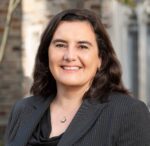 Yakut Gazi, Ph.D., Vice Provost for Learning Innovation and Digital Education at Duke University, joins the Membership Committee as a member for a one-year term (2024-2025). Dr. Gazi oversees the offices of Learning Innovation and Continuing Studies, with responsibility for the development and execution of pedagogical innovation and digital education strategies, youth academic enrichment programs, and continuing education and lifelong learning offerings. Previously, she was the Associate Dean for Learning Systems at Georgia Tech Professional Education. Her higher education experience spans over 30 years in four countries. Dr. Gazi has her Doctorate in Educational Psychology from Texas A&M University, and a Master’s in Educational Sciences and a Bachelor’s in Teaching Chemistry, both from Bogazici University in Turkey. A native of Istanbul, Dr. Gazi is married, with a daughter.
Yakut Gazi, Ph.D., Vice Provost for Learning Innovation and Digital Education at Duke University, joins the Membership Committee as a member for a one-year term (2024-2025). Dr. Gazi oversees the offices of Learning Innovation and Continuing Studies, with responsibility for the development and execution of pedagogical innovation and digital education strategies, youth academic enrichment programs, and continuing education and lifelong learning offerings. Previously, she was the Associate Dean for Learning Systems at Georgia Tech Professional Education. Her higher education experience spans over 30 years in four countries. Dr. Gazi has her Doctorate in Educational Psychology from Texas A&M University, and a Master’s in Educational Sciences and a Bachelor’s in Teaching Chemistry, both from Bogazici University in Turkey. A native of Istanbul, Dr. Gazi is married, with a daughter.
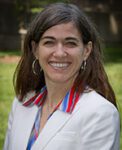 Kristen Brown, M.Ed., Director, Online Learning at the University of Louisville, will serve as a Policy Committee Chair for a two-year term (2023-2025). Brown has been with the University of Louisville since 2010, and in her current role she provides vision, strategic direction, and leadership in all aspects of the online learning operations, including expansion of the online program portfolio, online enrollment management, marketing online programs, online student support, staff development, budgeting, and distance education compliance. Prior to the University of Louisville, Brown was Assistant Director, Online Learning at the University of Illinois at Chicago. She earned her Bachelor’s from Miami University, and her Master of Education from Oregon State University.
Kristen Brown, M.Ed., Director, Online Learning at the University of Louisville, will serve as a Policy Committee Chair for a two-year term (2023-2025). Brown has been with the University of Louisville since 2010, and in her current role she provides vision, strategic direction, and leadership in all aspects of the online learning operations, including expansion of the online program portfolio, online enrollment management, marketing online programs, online student support, staff development, budgeting, and distance education compliance. Prior to the University of Louisville, Brown was Assistant Director, Online Learning at the University of Illinois at Chicago. She earned her Bachelor’s from Miami University, and her Master of Education from Oregon State University.
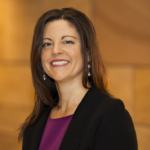
Bridget Beville, J.D., Vice President, Resolution Services & Title IX Coordinator at University of Phoenix, joins the Policy Committee as a member for a one-year term (2024-2025). Beville started her higher education law and policy journey with the University of Phoenix in 2005 as an associate faculty member. In 2007, she joined the University’s legal department doing state regulatory work and then spent five years in state government affairs supervising a team of lobbyists and representing the University’s interests in 15+ states. Beville returned to the legal department where she handled regulatory matters for several states and worked on state authorization and online reciprocity. She currently serves as the University’s Title IX Coordinator and oversees student complaints, student and faculty conduct and student academic appeals. Beville received her Juris Doctor from St. Mary’s University School of Law in San Antonio, Texas and her undergraduate degree from the University of Illinois at Urbana-Champaign.
 Corina Caraccioli, Ph.D., Assistant Dean of Online & City College at Loyola University New Orleans, joins the Policy Committee as a member for a one-year term (2024-2025). Dr. Caraccioli is also an Assistant Professor, and serves as the Director of Online Student Success, overseeing the university’s retention strategy for online programs. She is an InsideTrack certified success coach and trainer, committed to supporting the success of adult learners who need flexible and personalized support systems to reach their academic goals. Dr. Caraccioli’s work has been focused on shaping an environment that facilitates learning and growth, and fosters diversity. Her experience includes teaching undergraduate and doctoral courses in education in face-to-face, hybrid, and online formats. She has published and presented research at various national and international conferences. Dr. Caraccioli holds a Doctorate in Occupational and Adult Education and a College Teaching Certificate from North Dakota State University, a Master’s in Public Relations and a Bachelor’s in Communication and Public Relations from Babes-Bolyai University in Romania.
Corina Caraccioli, Ph.D., Assistant Dean of Online & City College at Loyola University New Orleans, joins the Policy Committee as a member for a one-year term (2024-2025). Dr. Caraccioli is also an Assistant Professor, and serves as the Director of Online Student Success, overseeing the university’s retention strategy for online programs. She is an InsideTrack certified success coach and trainer, committed to supporting the success of adult learners who need flexible and personalized support systems to reach their academic goals. Dr. Caraccioli’s work has been focused on shaping an environment that facilitates learning and growth, and fosters diversity. Her experience includes teaching undergraduate and doctoral courses in education in face-to-face, hybrid, and online formats. She has published and presented research at various national and international conferences. Dr. Caraccioli holds a Doctorate in Occupational and Adult Education and a College Teaching Certificate from North Dakota State University, a Master’s in Public Relations and a Bachelor’s in Communication and Public Relations from Babes-Bolyai University in Romania.
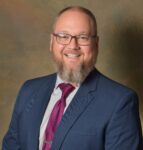
Abram Hedtke, M.Ed., Executive Director of Professional and Continuing Education at St. Cloud State University, joins the Policy Committee as a member for a one-year term (2024-2025). Abram leads the division of Professional and Continuing Education creating pathways for all members of the community, and creates business partnerships to design customized programs for specific needs. His division oversees all digital credentials through the university and degree-focused career advancements. For the past 19 years Hedtke has worked in both K-12 and higher education. He has held positions as Director of Instructional Technology, Instructional Curriculum Coach, Instructional Technology Coordinator, and Learning and Enrollment Systems Administrator. He is a passionate educator who presents nationally on topics involving accessible and instructional design equity as well as enhancing the online student learning experiences. Being an active member of local community groups and advisory boards, Abram works with community members and educators on anti-racist practices and is an equity advocate.
 George Irvine, Ph.D., Associate Vice Provost for Professional and Continuing Studies at University of Delaware, joins the Policy Committee as a member for a one-year term (2024-2025). Dr. Irvine leads the Division of Professional and Continuing Studies to annually serve approximately 14,000 online and continuing education students. In prior positions, Dr. Irvine led corporate and international programs at UD’s Lerner College of Business and Center for International Studies. Dr. Irvine has considerable international development expertise due to his work at the German Marshall Fund, IIE, and the Kenan Institute. His award-winning dissertation from UD’s Biden School focuses on the changing publicness of American research universities.
George Irvine, Ph.D., Associate Vice Provost for Professional and Continuing Studies at University of Delaware, joins the Policy Committee as a member for a one-year term (2024-2025). Dr. Irvine leads the Division of Professional and Continuing Studies to annually serve approximately 14,000 online and continuing education students. In prior positions, Dr. Irvine led corporate and international programs at UD’s Lerner College of Business and Center for International Studies. Dr. Irvine has considerable international development expertise due to his work at the German Marshall Fund, IIE, and the Kenan Institute. His award-winning dissertation from UD’s Biden School focuses on the changing publicness of American research universities.

Rob Kerr, MBA, Executive Director of Innovation and Opportunity at the University of Illinois, Springfield, joins the Policy Committee as a member for a one-year term (2024-2025). He leads the development of the university’s downtown innovation center, which will serve as the regional hub of business and social innovation, economic development, public policy advancement, and professional training. Kerr holds a Bachelor’s in Political Science and a Master of Business Administration. He is completing his Doctorate, exploring the impact of social networks on venture growth funding outcomes for underrepresented entrepreneurs.
# # #
About UPCEA
UPCEA is the online and professional education association. Our members continuously reinvent higher education, positively impacting millions of lives. We proudly lead and support them through cutting edge research, professional development, networking and mentorship, conferences and seminars, and stakeholder advocacy. Our collaborative, entrepreneurial community brings together decision makers and influencers in education, industry, research, and policy interested in improving educational access and outcomes. Learn more at upcea.edu.
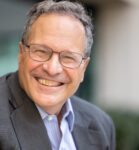
By Jay Halfond
About fifteen years ago, I hosted a pre-conference dean’s workshop at UPCEA’s Annual Conference. I opened the session by asking participants to compare their units with those of the person next to them. Not surprisingly, they highlighted their dissimilarities. Were this a meeting of, say, law school deans, they might have commiserated over mutual challenges – raising money, hiring faculty, chasing rankings, and so on. But their fundamental portfolio would not differ much. We, on the other hand, are characterized by how different we are from each other.
Beginning even with our names – which evolved from “extension” or “continuing education” or sometimes even the “evening college” – to more recent names often with “professional” in the title. These might be led by those titled deans, directors, vice-presidents, associate provosts – and can report to a range of university leaders.
Some online and professional education leaders (whether or not their official name) have broad university-wide responsibilities – supporting online education, overseeing summer term, participating in international initiatives, introducing credential innovation, and, even in some smaller institutions, accountability for graduate programs.
Some online and professional education entities are behemoths, others boutiques. Some oversee just noncredit programs, and others host degree programs as well. Some create their own degrees; others support the traditional colleges within their universities. Some hire their own full- or part-time faculty, and others rely on their schools or colleges to staff courses. Some are budgeted as cost-centers, others self-supporting. Some are highly integrated in the institutional mainstream; others operate more on the periphery.
Many online and professional education entities have a mix of these models baked into their structure. When, as dean, I was asked in UPCEA surveys to characterize Boston University’s Metropolitan College as either academically centralized (that is, in control of our own degrees) or decentralized (beholden to BU’s other colleges), I was paralyzed by this binary choice. We mostly relied on our own degrees, but sometimes cobranded others with a fellow college, or, in some cases, invisibly supported another college. We hired our own faculty, but occasionally recruited faculty on overload from other parts of the university.
I was stymied when simply asked what Metropolitan College is – and I worked to come up with the concise elevator speech. MET is a “university within a university,” an “innovative hub” for the university, an advocate for the “adult learner” – but my generalizations never quite captured our range and essence, or clearly differentiated us from other parts of the university. Many I met in greater Boston thought they already knew MET from one familiar program and generalized accordingly – perhaps because they had attended a culinary class or event, knew a midcareer professional who earned a certificate or degree, or read about our prison program.
I learned to accept, defend, and even embrace our quirkiness, and appreciate that we served an ever-changing role in an ever-changing university in an ever-changing world. I realized that had I chosen complacency over growth, we would have shrunk in size and missed opportunities to significantly expand our audience and take the university in new directions.
This agility to change in ways critically important to our institutions is even more prevalent now across our field. In the recent decade, UPCEA has evolved from a guild of distinct, somewhat recognizable entities in most universities – to a much bigger tent of those who are committed (regardless of where they sit in their institutions) to online learning, microcredentials, working professional students, and addressing the educational needs of their local communities. It has become even more challenging to articulate our common denominator.
Those under this umbrella of online and professional continuing education are even more susceptible to moving parts and changing directions in their institutional home. More than two-thirds of UPCEA’s members experienced reorganizations in just the past five years. They are increasingly vulnerable to restructuring, takeovers of particular programs and functions, and the whims and visions of new leaders. This is often a sign of success – and willingness to embrace change. Three-quarters of our institutional representatives believe their units are agile and innovative.
I am convinced that – like snowflakes – no two online and professional education enterprises are ever the same, or, for that matter, stay the same for very long. They may look slightly similar from afar, but this masks their institution-specific quirks and qualities. We exist in an almost perpetual identity crisis. We invite attention if we are too small or become vulnerable when we grow too large.
How do we turn an identity crisis into an asset? Our common characteristic is that there is no limit to our potential role in an institution – even when we might have to navigate a perilous path, and even though we are subject to instability and forces beyond our control. Our common professional function is to be at the nexus of what makes an institution dynamic, exciting, and important: changing workforce needs and demographic realities, new modes of learning, and unlimited opportunities to enhance individual and social change through lifelong learning. Through our breadth, agility, and generosity of spirit, our institutions often (or should) turn to us. Even though I found my deanship daunting almost daily, as I navigated how best to innovate and grow, it never occurred to me that any other university job could ever be as exhilarating and fulfilling.
Our common dominator is that we thrive in the often most uncertain and unsettling aspects of academe, and our professional association is even more critically important because of this.
Jay A. Halfond is the former dean of Boston University’s Metropolitan College, a Professor of the Practice Emeritus at BU, and now UPCEA’s Vice-President for Institutional Strategy, overseeing our corps of Strategic Advisors in supporting the growing need for UPCEA’s consulting services. He can be reached at [email protected].
In the whirlwind of developments regarding AI, we must move from anxiety to anticipation and preparation for what the future portends.
OpenAI was much in the news this past Thanksgiving week. Centered on the firing and re-hiring of the company’s CEO, Sam Altman, the world watched and considered the future of artificial intelligence in our lives. It was a valuable wake-up call to those who have minimized the impact of AI in our future lives.
I understand the anxiety some feel when they are told that something is coming that will change their lives forever. Artificial General Intelligence (AGI) will mean that humans will no longer be the apex of our domain. Coming to our future is an entity with superior knowledge, decision-making ability, and influence in our society. That may be a bit unnerving. And, yet, it also means we will likely have rapidly-emerging cures to diseases, solutions to the plague of poverty, rational strategies to mitigate the ill-effects of climate change, and possible resolutions to conflict among countries and peoples. The potential for good is enormous.
It is not at all clear that the Large Language Models (LLMs) of Generative AI (GenAI) that we are experimenting with today will directly lead to AGI; likely not. Yet, even with the relatively modest GenAI, we are finding solutions to problems that have proven so difficult to solve in the past. Within higher education, GenAI has begun to more effectively and efficiently tutor students through self-paced, personalized learning. By identifying student needs as they progress through a course, these technologies can prescribe or develop custom tutorials that inform and teach students what they need to know in order to progress. This is exemplified by a collaboration between OpenAI and Khan Academy, highlighted in a recent TED Talk:
“Sal Khan, the founder and CEO of Khan Academy, thinks artificial intelligence could spark the greatest positive transformation education has ever seen. He shares the opportunities he sees for students and educators to collaborate with AI tools — including the potential of a personal AI tutor for every student and an AI teaching assistant for every teacher — and demos some exciting new features for their educational chatbot, Khanmigo.”
Certainly, GenAI models today have ample room for improvement. This is not unusual in the development of any technology. I would suggest that we compare this one-year-old technology with other revolutionary technologies at the point of their first year of use. The Model T Ford was far short of the potential of automobiles in 1909, one year after it was released. We have seen dramatic improvements in speed, performance, safety and capability among automobiles over the past 115 years. The first cell phones released in 1973 were the size and weight of a brick. Fifteen years later, we were still using the heavy, large “bag phone” that was so named because it came in a bag with an over-the-shoulder strap to allow for “easy” carrying. However, today, we have the choice of a wide array of cell phones with many options in size, memory, video, and a host of other capabilities. There is even a cellphone in the form of a miniature wearable pin with most all of the capabilities of a standard cell phone and more.
Training modes and methods for GenAI powered bots will continue to bring about improvements. In just the last month, many of the apps announced that they have implemented new and improved versions of their LLMs, most notably Anthropic announced Claude 2.1, Open AI announced GPT-4 Turbo, and Inflection announced version 2. Each of these represents major improvements and enhancements of the capabilities of the associated GenAI app.
Fortunately, there are an increasing number of different GenAI apps using different LLMs so one can quickly and easily sample responses to the same prompt from a variety of apps to identify any responses that seem outside the norm, possibly hallucinations by the app. It is this process of competition that helps to drive improvement and minimize aberrations. Independent research labs monitor and report results across the industry: “A new hallucination index developed by the research arm of San Francisco-based Galileo, which helps enterprises build, fine-tune and monitor production-grade large language model (LLM) apps, shows that OpenAI’s GPT-4 model works best and hallucinates the least when challenged with multiple tasks.”
While we must continue to be cautious, it is time for us to move on to anticipation of the new capabilities that will be enabled by AI in education. We can anticipate much swifter, deeper research across the spectrum of higher education. The power of AI is in the ability to handle vast volumes of data in microseconds, even approaching nanoseconds, with appropriate hardware and architecture in certain applications. Analysis, synthesis and predictive powers are offered by these tools at speeds and volumes that were unthinkable in the past. We should be anticipating what applications can be enhanced by the power and speed of AI. How will these characteristics enhance our products and processes?
The anticipation should lead us to preparation. It is time, even now, to begin to prepare for the advent of Artificial General Intelligence. In what areas will that enhance our ability to teach, learn, research and serve the needs of the greater community? How will higher education become more efficient and effective? How will this impact our centuries-old administrative structures, our human staffing, and our responsiveness to the needs of our students and wider community? Can we begin now to make adjustments that will prepare us for the changes that we know will inevitably come?
There is much work to be done to prepare for the changes that we know will come, let alone those that we have yet to understand. Who is leading this process at your university? Has this been given the priority and support that is necessary to ensure the future of your institution?
This article was originally published in Inside Higher Ed’s Transforming Teaching & Learning blog.
The maturation of online learning, the explosion of AI, the continuing declines in enrollment, and the rise in the importance of ROI, for students and institutions – these are among the converging factors that are shaking up the status quo in higher education. In this environment, online and professional continuing education is poised to play a significant role in the recasting of higher education.
Working side-by-side with the leaders and innovators in the space, our UPCEA experts are ideally positioned to bring clarity to and understanding of the trends, issues and events driving disruption and change. For this reason, we asked them to share their expectations for the year ahead. UPCEA’s Predictions 2024: Insights for Online and Professional Education captures their insights and can be used to help institutions and practitioners understand the impact on their organizations. The 16 expert insights in this compilation are derived from some of UPCEA’s key focus areas:
- Leadership in Online Learning
- Professional and Continuing Education
- Alternative Credentials
Among the predictions featured are:
- More Campus Leaders Will Embrace Business Model Transformation to Spur Innovation in Serving Today’s Learners
- Welcoming Online Learning to the Leadership Table Becomes a Double-Edged Sword
- Continuing and Professional Education Will Be the Entry Point for AI at Many Institutions
- Online and Professional Continuing Education Will Help Fortify Institutions in the Face of Declining Enrollment Trends
- ‘Synthetic Human’ Technology Will Be Applied in Higher Ed, With the Potential to Enable Engaging ‘Student-to-Student’ Interaction in Self-Paced Online Classes
- External Forces Will Impact Online and Professional Learning in a Variety of Ways
Explore what 2024 has in store for online and professional education. Download a copy of UPCEA’s Predictions 2024: Insights for Online and Professional Education.
Read the press release, “UPCEA Unveils Top Predictions for Online and Professional Education in 2024.”
UPCEA’s experts explore the explosion of AI, maturation of online learning, enrollment declines and other factors impacting the future of higher ed.
WASHINGTON, D.C. (Dec. 4, 2023) – UPCEA, the online and professional education association, today released its Predictions 2024: Insights for Online and Professional Education. In this report, UPCEA’s experts provide insights that bring clarity and understanding of the trends, issues and events driving disruption and change, including the explosion of AI, maturation of online learning, enrollment declines and the increasing importance of ROI.
“Online and professional continuing education is poised to play a significant role in the recasting of higher education,” said Bob Hansen, CEO of UPCEA. “As the base of residential students continues to erode at many institutions, campus leadership will increasingly turn to those who understand how to serve contemporary learners.”
The report includes 16 unique insights from 11 top experts in the online and professional education arena. A sampling of these predictions includes:
- More Campus Leaders Will Embrace Business Model Transformation to Spur Innovation in Serving Today’s Learners
- Welcoming Online Learning to the Campus Leadership Table Becomes a Double-Edged Sword
- Continuing and Professional Education Will Be the Entry Point for AI at Many Institutions
- Online and Professional Continuing Education Will Help Fortify Institutions in the Face of Declining Enrollment Trends
- ‘Synthetic Human’ Technology Will Be Applied in Higher Ed, With the Potential to Enable Engaging ‘Student-to-Student’ Interaction in Self-Paced Online Classes
- External Forces Will Impact Online and Professional Learning in a Variety of Ways
Insights contained in the report are organized within some of UPCEA’s key focus areas:
- Leadership in Online Learning
- Professional & Continuing Education
- Alternative Credentials
The following UPCEA staff and advisors contributed their predictions for the report:
- Aaron Brower, Strategic Advisor, UPCEA; Professor Emeritus, University of Wisconsin-Madison, and a Fellow with the John N. Gardner Institute for Excellence in Undergraduate Education
- Derek Bruff, Strategic Advisor, UPCEA, and Visiting Associate Director, Center for Excellence in Teaching and Learning, University of Mississippi
- Susan Catron, Strategic Advisor, UPCEA, and Dean Emerita from University of California, Davis
- Stacy Chiaramonte, Senior Vice President of Strategy and Operations, UPCEA Research & Consulting Group
- Marie Cini, Strategic Advisor, UPCEA, and Provost and Chief Academic Officer at University of The People
- Jay Halfond, Vice President, Institutional Planning, UPCEA, and Professor of the Practice Emeritus at Boston University
- Robert Hanson, Chief Executive Officer, UPCEA
- Amy Heitzman, Deputy Chief Executive Officer & Chief Learning Officer, UPCEA
- Kathleen Ives, Chief Business Development Officer & Senior Vice President of Member Engagement, UPCEA
- Ray Schroeder, Senior Fellow, UPCEA and Professor Emeritus at the University of Illinois, Springfield
- Julie Uranis, Senior Vice President, Online and Strategic Initiatives, UPCEA
UPCEA’s Predictions 2024: Insights for Online and Professional Education is available for download at https://upcea.edu/insights-for-online-and-professional-education/.
About UPCEA
UPCEA is the online and professional education association. Our members continuously reinvent higher education, positively impacting millions of lives. We proudly lead and support them through cutting edge research, professional development, networking and mentorship, conferences and seminars, and stakeholder advocacy. Our collaborative, entrepreneurial community brings together decision makers and influencers in education, industry, research, and policy interested in improving educational access and outcomes. For more information visit https://upcea.edu/.
Online learning provides a convenient way for students to achieve their academic goals from a distance. At the same time, it presents a unique set of challenges that can impact student belonging, connectedness, and ultimately, retention.
Post-pandemic, hybrid course design has become the standard for many universities and colleges. 30% of degree-seekers study exclusively online.1 In response to this growing demand for online learning, two-thirds of colleges & universities are adding more online programs. Yet only 9% have fully developed online community building services to foster sense of belonging and drive retention.2
For the University of Arizona Online, their Wildcat From Anywhere initiative has been instrumental to increasing belonging, connectedness, and retention. In a recent webinar with Mentor Collective, the Arizona Online team shared key findings that are leading to improved retention and best practices to create a culture of engagement in online learning.
Connection is Tied to Both Student & Institutional Outcomes
Arizona Online has seen steady two-digit enrollment growth year over year since 2018, with 13 percent growth between 2022 and 2023. Executive Director Dr. Caleb Simmons attributes this to a focus on retaining current students while investing in recruiting prospective students. Noting that national averages in attrition for online institutions near the 55 percent mark, Simmons feels passionately about strategies that help students persist to both fulfill the promise of higher education and recoup the investments made in attracting online learners.
“As we’re thinking about how we grow and how we maintain, an investment into the student success team is vital to achieving our overall growth goals. That means ensuring students are part of a community, they’re achieving their goals, and that they feel like they belong at the University of Arizona.”
Identify the Isolation
For people who are learning from digital devices and not in-person, it’s easy to feel separated from peers. The asynchronous and virtual nature of the learning experience can drive a sense of disconnection. Students can’t turn to the person next to them to ask a question, and lecturers can’t see how the students are responding to the material, both of which can have a real impact on academic progress and performance, which can hamper retention and persistence.
This isolation isn’t just limited to the classroom. On-campus peer-to-peer events are a core part of what makes students feel a sense of belonging. Online students can easily feel excluded and disappointed when events that get promoted aren’t available to them.
As a result, the appetite for connection is high among online students. They crave a community that makes them feel a part of the school’s community. At The University of Arizona Online, 848 students (20 percent of the learner population) matched with a mentor, further showing how much demand there is for peer relationships and the sense of connection.
Reimagine the Online Experience
The secret sauce for Arizona Online was taking cornerstones of the in-person, on-campus experience and reimagining them for a virtual learning world. Take what works in-person and think of how to translate and re-envision it in a way that will resonate with and be relevant to the student population you serve. This could be as simple as providing virtual options for events and programs so online students can attend.
According to Senior Director of Online Student Success Carmin Chan Ph.D., “what we’ve done with this program is not try to make it a third rail or a separate entity, but instead, try to work within and find ways to innovate.” Making online students feel present and included goes a long way in building a strong sense of belonging, which ultimately boosts retention.
A Timely Response Makes Students Feel Valued
Due to the isolation that many online students feel, speed of response and feedback is a critical piece of the connectedness puzzle. Students can easily feel like they are on an island, especially when they are struggling, and a difficulty in accessing resources quickly exacerbates this feeling. It’s not just about making them aware of the resources; institutions have to get those resources into students’ hands as quickly as possible, and mentorship can play a key role in that.
When a student’s having a hard time, a timely response from a peer mentor can be the thing that keeps them going. Arizona Online found that a student who had three conversations with a mentor is much more likely to persist. Having someone to help them get them plugged into the right resources at the right time goes a long way to make a student feel heard and cared about. Sometimes all they need is someone to reassure them that they are doing the right things, and a mentor is the perfect person to do that.
Invest in Identity-Based Connection
When students are able to have honest, authentic conversations with someone they have things in common with, they will feel a stronger sense of community. According to Arizona Online’s Senior Student Success Coach Heidi Creel, “our mentees are learning that there are other people like them, they’re not alone, and there are resources to help them out.”
University of Arizona Online’s dedication to student success is evident from the moment students first request information through their first year and beyond. This holistic strategy that includes peer mentorship, student success coaches, and yearly student surveys has contributed to a 22 percent increase in retention.
By intentionally and proactively building systems to encourage community and connectedness, schools can foster a stronger sense of belonging, which directly impacts retention.
About Mentor Collective
Want to learn more about how Mentor Collective has supported over 200,000 students at 180+ colleges and universities through mentorship? Get in touch today to speak with one of our team.
Sources:
- Online Education Trends Report (2023) Best Colleges.
- CHLOE 8 Student Demand Moves Higher Ed Toward a Multi-Modal Future. Quality Matters. (2023)
